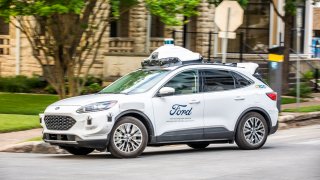
In 2017, automakers were scrambling to develop cars that could drive themselves.
Ford Motor bet a billion dollars on a startup called Argo AI to catch up to flashy tech companies like Google, Uber and Tesla. Volkswagen, the second-largest automaker in the world, signed on as a backer in 2019, investing $2.6 billion Argo AI at a valuation of more than $7 billion.
By 2021, Argo AI was valued at $12.4 billion and counted 2,000 employees, with offices on two continents and self-driving tests underway in seven cities.
There were plans to bring a self-driving taxi service to market by 2021, rivaling those by Waymo and Ford's larger Detroit rival, General Motors.
Get DFW local news, weather forecasts and entertainment stories to your inbox. Sign up for NBC DFW newsletters.
But in October 2022, Argo AI shut down.
It was another sign that after years of big investment, investors were reining in expectations and money was drying up.
After a rush of enthusiasm, self-driving projects have grown besieged by the challenge of developing needed technology and establishing a business model that's sufficiently profitable to justify the billions they spend.
Money Report
In fact, all kinds of mobility projects are losing money — bike-share, ride-hailing, scooters and shuttles, alike.
"The challenge for Ford and for everybody else is trying to figure out how to provide these kinds of mobility services and actually build a viable, self-sustaining business out of it while keeping the cost of the service affordable for people using the services," said Sam Abuelsamid, principal research analyst at Guidehouse Insights. "They're still struggling. Everybody is still struggling with that part of it."
Ford has scaled back its ambitions and is focusing on technology that can make money in the near term.
Rivals are pressing ahead, though it could be years before they make money. In the meantime, industry watchers are wondering which company will be the next to pull the plug.
Watch the video to learn more.






